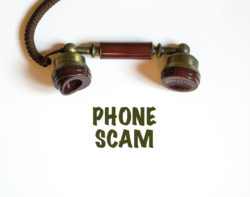Top Class Actions’s website and social media posts use affiliate links. If you make a purchase using such links, we may receive a commission, but it will not result in any additional charges to you. Please review our Affiliate Link Disclosure for more information.

A robocall is defined as a phone call that uses a prerecorded message as opposed to a live person. Consumers often receive many calls from the same number, which is annoying and often indicates a scam.
According to All Home Connections (AHC) tech specialist Lily Lowe, the number of robocall complaints increased by 46 percent between 2017 and 2018. Around 60 billion automated telemarketing calls are received each year.
“Scammers are very smart these days and have several different ways to get our phone numbers,” Lowe told Tech Republic.
“Some of those ways include surveys or contests that we enter, and large scale data breaches from companies that hold your information. Scammers use spoofing technology that allows them to put in different zip codes or numbers that look safe to you. There is a ton of technology out there that online scammers can use or have created specifically for phone spoofing.”
Due to these calls, federal authorities and phone carriers have done their best to curb harassing telemarketing communications.
Protections Against Robocalls
The federal government has passed laws to protect consumers against annoying automated calls. One of the laws that protect consumers is the Telephone Consumer Protection Act (TCPA). The Federal Communication Commission (FCC) is the federal agency that oversees TCPA rules.
In 2012, TCPA rules were changed to provide increased protection from telemarketing calls. Under the newer rules, businesses need to have prior express written consent in order to robocall consumers. Having an “established” business relationship does not constitute consent when it comes to telemarketing calls. The rules also require businesses to include an automated, interactive opt out mechanism during each robocall which allows consumers to tell them they would like the calls to stop.
Other revisions to TCPA rules created the National Do Not Call registry in partnership with the Federal Trade Commission (FTC). When consumers register for this federal database, it tells telemarketers that they do not want to be contacted with sales calls. Unfortunately, this database may not necessarily provide the same protections against robocalls due to the fraudulent nature of these calls.
“[I]f you haven’t given the company permission, and the robocall isn’t purely informational — like your cable company confirming a service appointment — there’s a good chance it’s a scam. At the very least, it’s from a company you don’t want to do business with,” the FTC notes.
The FCC has also announced that it would be launching a caller ID authentication program known as SHAKEN/STIR. This stands for Signature-based Handling of Asserted Information Using toKENs (SHAKEN) and the Secure Telephone Identity Revisited (STIR), respectively.
This new program is reportedly “a reliable authentication system to strengthen call-blocking services and unmask spoofed calls.” AT&T, Bandwidth, CenturyLink, Charter Communications, Comcast, Cox, Frontier, Google, Sprint, TDS Telecommunications, T-Mobile USA, U.S.Cellular, Verizon and Vonage Holdings were reportedly involved with this program at its start.
Robocalls still remain a large issue in the United States, but regulatory agencies like the FTC and FCC are always trying to better protect consumers against annoying robocall communications.
Join a Free TCPA Class Action Lawsuit Investigation
If you were contacted on your cell phone by a company via an unsolicited text message (text spam) or prerecorded voice message (robocall), you may be eligible for compensation under the Telephone Consumer Protection Act.
This article is not legal advice. It is presented
for informational purposes only.
ATTORNEY ADVERTISING
Top Class Actions is a Proud Member of the American Bar Association
LEGAL INFORMATION IS NOT LEGAL ADVICE
Top Class Actions Legal Statement
©2008 – 2024 Top Class Actions® LLC
Various Trademarks held by their respective owners
This website is not intended for viewing or usage by European Union citizens.















17 thoughts on10 Percent of Americans Reportedly Scammed By Robocalls Annually
Sick of these daily calls and messages
Add me
I have sent information 3 times on your website for a Free TCPA Class Case Evaluation, Noone has ever replied.
Add me
Add me
Sick of these daily calls and messages.